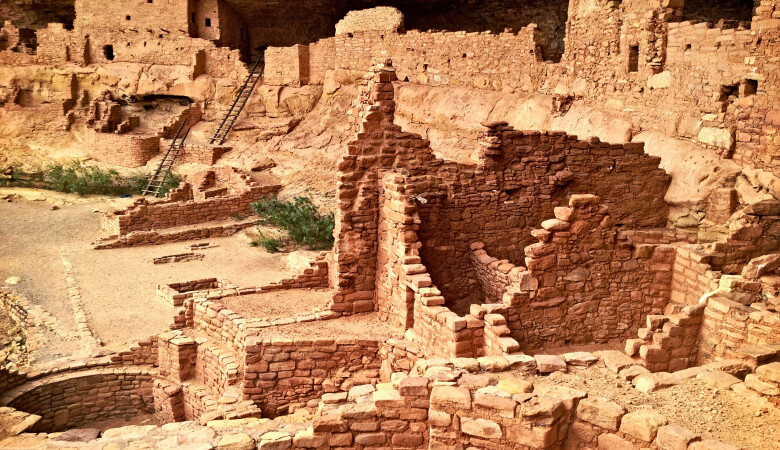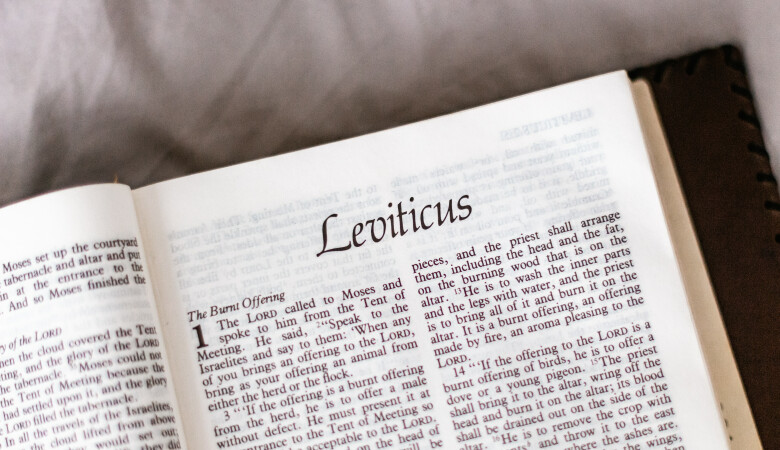The Superiority of the New Covenant (Hebrews Sermon 31 of 74)
June 05, 2011 | Andy Davis
Hebrews 8:7-13
Covenants, New Covenant, Old Covenant
The Treasures of the New Covenant
Do you realize as Christians just how wealthy you are? How rich you are? That's my goal today, that you would as a believer in Christ, that you would go away having a sense of great wealth of treasure of riches specifically in the New Covenant, today. So often, the blessings of the Gospel are portrayed as hidden treasure. You think about Jesus in his parable saying, "The Kingdom of Heaven is like treasure hidden in a field. When a man found it, he hid it again, and then in his joy, went off and sold everything he had and bought that field."
So, I wonder what it's like after that to open up the treasure and really rummage through it and find out just what you have now. Now that you sold everything, to get it just how valuable, how precious are the treasures inside that box, that treasure box. Or another place in Colossians, it says that in Christ are hidden all the treasures of wisdom and knowledge and so you get the same idea of opening Christ up and finding out how much wisdom and knowledge, how much rich blessing there is in Jesus. And the meditation that comes in Christ. In Christ are hidden all the treasures of wisdom and knowledge. Or in Proverbs Chapter 2, we're told the search for wisdom and insight as for silver, and hidden treasure. And so I had the picture this morning of a family being called to the reading of the last will and testament of a wealthy relative and perhaps the grief over the loss of the relative has gone, but now there's time of the reading of the will. And how excited, you would be if you knew that this aunt or uncle or grandparent, was really quite wealthy and you might wonder, perhaps in a very carnal, sense, "What's in it for me? What am I getting etcetera?" Well, I think that this may be a reading of the last will and testament of Jesus Christ.
We are looking at what Jesus has bequeathed on us by His blood, what he paid for in blood for us to have. That's what we're looking at today. The elements of the New Covenant, which were not there in the Old Covenant. The night before Jesus died, after the supper, he took the cup in his hands and he gave thanks, and he said, "Drink from it all of you. This is the my blood of the Covenant, which is given for many for the forgiveness of sins." The blood of the New Covenant is the blood of Jesus and this New Covenant is superior to the Old Covenant. We've seen that as a uniting theme in the book of Hebrews. The superiority of Jesus Christ in every way to all of the elements of the Old Covenant, and Jesus is superior in every way and recently we've been contemplating the superiority of Jesus Christ as our great high priest. But now we have a transition to the second main aspect of the book of Hebrews, the superior covenant that He comes to bring.
So, a superior mediator, brings a superior covenant, resulting in a superior life. That's my general three point outline for the whole book of Hebrews. And so we have a transition going on now, and we're going to focus now on the specific elements of this New Covenant that Jesus came to bring. That He died to give us. And so we have in Hebrews 8:6, a transition. We've been looking at the elements of the Old Covenant priesthood and how the Levitical priest did this and that and this tabernacle that was just a shadow and a copy of the Heavenly one and all that. And then in Verse 6 it says, "But the ministry Jesus has received is as superior to theirs as the Covenant of which He is mediator is superior to the old one." And listen to this, "it is founded on better promises." And today we have the privilege of studying in detail what those promises are.
We get to understand the superior promises of the New Covenant.
I. The Need for a New Covenant (vs. 7)
Now I begin this passage by talking about the need for a New Covenant, the need for the New Covenant. Look at Verse 7, it says, "If there had been nothing wrong with that first covenant no place would have been sought for another." So there is established here in Verse 7 the need for a New Covenant. Now this is something we've already seen in Hebrew 7. We've already been through it as we contemplated the change of the priesthood. And so in Hebrews 7:12, we saw where there is a change of the priesthood there must be a change of the law. You've got to have a new law. Jesus is our great high priest, but he was of the tribe of Judah, and concerning that tribe nothing was ever said of the priesthood in the Old Covenant, in the old law. And so, if Jesus is going to serve as our great high priest, we must have a change of the law. So we've already looked at all that. And so the author is going to argue that now in the same way we must have a New Covenant.
He makes a parallel argument. The way it works is we have an Old Testament prophecy or prediction of the establishment of a new ministry. And then he reasons from that saying that the existing ministry was insufficient. It was inadequate or else there wouldn't be any need for a new one. We've already seen this with Psalm 110 and Verse 4, "The Lord has sworn and will not change his mind. You are a priest forever in the order of Melchizedek." The promise given. And then he reasons from that saying, "Look, if the Levitical priesthood were sufficient that promise wouldn't have been made, but it was inadequate. It was insufficient. And so we need to have a new priesthood, one in the order of Melchizedek." Well he's going to do the same thing here. It's the same kind of logic. We have a prediction we have a prophecy, Jeremiah 31:31-34. The prediction is of a New Covenant, and he's going to argue in the same way. If there'd been nothing wrong with that, first covenant, why would we be seeking a new one? And so just the existence in the Old Testament of these promises says something new and something better. Something more glorious must come. And so now we're looking at exactly what that is.
The Inadequacies of the First Covenant
Now, he says that there's something wrong with that first covenant. If there'd been nothing wrong with it, no place would have been sought for another. So there's something wrong. There's something to some degree blame worthy with that first covenant. Now, we have to be careful here. We know that the author has already said concerning that first covenant, "the former regulation is set aside because it was weak and useless." Those are very strong terms being made here, but that first covenant was weak and useless in achieving for the people of God the final end of salvation. That we should be made holy and blameless in God's sight. That we sinners should be made perfect in the sight of a Holy God. The first covenant couldn't do it.
It was ineffectual. It was weak and ineffective for accomplishing that, and so a better covenant had to come. We should not imagine that God tried to establish the covenant, it didn't work, it kept not working, and so he went to from the prototype to the final version. Just like companies put out a product and they do a narrow market run for a while and then they find out some flaws with it and they perfect it and they improve it and then, the better product is released nationally.
Well that's not what's going on here at all. There's nothing wrong in one sense with the first covenant. Everything God does is perfect. Frankly, it achieved exactly what God wanted it to achieve, which is to expose the flaws of human nature. And so he actually goes in verse 8 saying that the problem was with the people, not with the covenant for "God found fault with the people." And so it's very, very plain. As Paul puts it in Romans Chapter 7, "The law is holy and righteous and good." Or in in Romans 7:14, "We know that the law is spiritual, but I am unspiritual. I am sold as a slave to sin." There's nothing wrong with the law, there's something wrong with me.
And that's what's being established here by this covenant. Again, we have the same thing in Romans 8:3, "For what the law was powerless to do, in that it was weakened by the sinful nature, God did by sending His own son in the likeness of sinful man to be a sin offering." The law was weakened by our flesh. So that's where the flaw lies. And so, there must be a New Covenant. The need for the New Covenant is clearly established in Verse 7.
II. The Promise of a New Covenant (vs. 8-9)
Now, here we have in verses 8-9, the actual promise of a New Covenant. We have the words of Jeremiah here. You see the sovereignty of God, God is going to establish this New Covenant. He makes this clear prediction here, "The time is coming, declares the Lord, when I will make a New Covenant with the house of Israel and with the house of Judah. It will not be like the covenant I made with their forefathers, when I took them by the hand to lead them out of Egypt, because they did not remain faithful to my covenant and I turned away from them. Declares the Lord." So the sovereignty of God is the absolute focus here. Now, when we speak of the covenant here, what do we mean by a covenant? A covenant is simply an agreement, a binding agreement, between two or more parties. That's all it is. Just a binding agreement. And God has significantly acted throughout history with covenants. God has made binding agreements between Himself and His creation, His created ones.
And so we're talking about the establishment of a New Covenant. Now, which covenant is he talking about here that has to be replaced? Now in the Old Testament and the Old Testament readings there are a number of significant covenants. For example, in the time of Noah, a covenant was made. God made a covenant with Noah, and with every living thing on earth that He would never again inundate, or flood, the world with water. Destroy the world by flood as He had done. He also makes a covenant with Abraham saying through Abraham's, seed, all peoples on Earth will be blessed and he makes a covenant with David, saying that He would raise up one of David's sons to sit on His throne forever.
Well, these are three very significant covenants, but that's not the Old Covenant that the author is talking about here. The Old Covenant that the author has in mind here is the covenant made during the time of the Exodus under Moses, the Mosaic Covenant. The covenant made with Israel at Sinai. It's very clear because he said, "It will not be like the covenant I made with their forefathers, when I took them by the hand to lead them out of Egypt." That's the covenant that is now superseded. That's the covenant that was weak and useless for saving us in the end. That was the covenant that is now obsolete, the Mosaic Covenant. On that day, you remember God assembled all of the people at Mount Sinai, and how God descended in a cloud and fire and the top of the mountain, and how the ground beneath their feet shook.
How it trembled and how God spoke the words of the 10 Commandments to the people, and the people actually heard the voice of the living God speaking to them out of fire and they were all of them, including Moses absolutely terrified. And how the people trembled. The essence of this covenant was the moral law of God written in tablets of stone external to the people. They could study them, inscribed in tablets of stone, coupled with the animal sacrificial system. The Levitical priesthood with the tabernacle, and the animal sacrifices and so the Old Covenant and said, "This is God's moral standard. Do this and you will live."
And if there was any sin there was this symbolic or shadowy atonement set up. This is the Old Covenant, the essence of the Old Covenant. Problem was with the people and the history of the peoples forsaking of that covenant, hinted at here in the prediction by Jeremiah. How God carried out or related all of their history. "They did not remain faithful to my covenant." That's a summary statement of centuries of rebellion and the part of the people of God. A tragic turning away. The people turned away from that Mosaic Covenant. They would not keep it. Despite the fact that they trembled, the ground shook under their feet. Despite the fact that they had heard the voice of God speaking in their own ears and lived. And they heard God say, "I am the Lord, your God, who brought you out of Egypt, out of the land of slavery. You shall have no other gods before me. You shall not make for yourself an idol in the form of anything in heaven above or on the earth beneath or in the waters below."
Despite all of that, while Moses was still up on the mountain receiving the rest of God's words, Aaron the first high priest, led them into grave sin as they made a golden calf. He said, "Here are your gods, O Israel, who brought you up out of Egypt." And they bowed down and they worshiped. And it led them into a riot is orgy and great wickedness. And from that very beginning, once they entered into the Promised Land, they soon prostituted themselves with the gods of the peoples that lived in that land before them. And they made idols and they bowed down and worshipped. Bowed down to and worshipped what their hands had made. And God sent them warnings, again and again he sent them prophets to warn them. He sent them gentile armies who would come and plunder them. Again and again, God warned them, but they would not listen.
And the darkest moment of all of that history of rebellion, I think came in Jeremiah's Day. God raised up Jeremiah, sent Him as a prophet of doom. Really the quintessential prophet of doom. And he went and stood at the gates of the temple, and he proclaimed the doom of Jerusalem as Babylon was coming. The Babylonians under Nebuchadnezzar were coming and Jeremiah day after day after day, warned them that wrath was coming on them because of their sins. And he was universally hated by the people there and persecuted. They would not listen. And they sought to kill him, but they could not. Jeremiah, the weeping prophet, one who is there when Jerusalem was finally destroyed by the Babylonians. The temple completely destroyed and Jeremiah, I imagine him sitting on the hillside, looking down over the smoldering ruins of what used to be the daughter of Zion, the city of Jerusalem. This weeping prophet saying, "How desolate lies the city once so full of people." Jeremiah had I think the hardest ministry in the Old Testament era. Very, very difficult ministry, but in the middle of that dark, dark hour, he speaks this promise to Jeremiah, the promise of a New Covenant that is going to come and fix the very root of the problem. And that is the hearts of the people.
And so he gives Jeremiah in Jeremiah 31:31-34, this incredible prophecy, and it's brought over word for word here into Hebrews 8, this is the longest New Testament quotation of an Old Testament passage in the Bible. The longest one, and it's actually repeated again in Hebrews 10, so it's incredibly vital that we study this and we understand this. And God said, "It would not be like that first covenant I made." And why is that? "'Because they did not remain faithful to my covenant and I turned away from them,' declares the Lord." How dreadful are those words? How God turned away from them. He turned His back on them. He would not listen to their cries as they were being slaughtered by their enemies. God was bringing that slaughter on them as a punishment for their sins. God had turned away from them, declares the Lord. But know he's going to establish a New Covenant that would be unlike it. And how would it be different?
The Difference of the New Covenant
I tell you it is the era, it is the New Covenant in the blood of Jesus, by the power of the Holy Spirit. That's the essence of the New Covenant. The blood of Jesus paid for it and the Holy Spirit administers that blood to us individually. It is the encounter that each believer from the least of us to the greatest has with God through the Holy Spirit. That's the difference. That is how this covenant is not like the first one. Now, with whom is this covenant made? Well he says...
He talks about in Verse 8, The House of Israel and the House of Judah, and then again in Verse 10, the House of Israel again, So he's using language of Jeremiah's day, speaking of God's people, the descendants of Abraham, the sons and daughters of Abraham. But we have learned in the New Testament, that God through Jesus has abolished in His flesh the law with its commandments and regulations and has destroyed the barrier, the dividing wall of hostility between Jew and gentile, we who are at one point, aliens and strangers, we gentiles who are on the outside are now welcomed in through faith in Jesus. And we have now become sons and daughters of Abraham by faith. Abraham's our father in faith. And we stand under the blessings of this covenant. We are through faith in Jesus, the House of Israel and the House of Judah, and so were the Jews who repent and believe in Jesus as well.
Anyone who believes in Jesus is the house of Israel and the House of Judah. That's who he's making this new covenant with. Oh, how rich you are, gentile believers in Jesus. We were at one point, aliens and strangers. We were foreigners to the covenants of the promise, but now we have been brought in through the blood of Jesus. And that's who He makes this covenant with and it's universal, Verse 11, "They will all know me, from the least of them to the greatest." That's this table setting. Now, let's get into the riches. Let's try to understand the superior elements of the New Covenant. Things we never had in the old covenant, and there are three. This is the center of the sermon. This is, to me, the most exciting part of the Book of Hebrews. What do we get in the new covenant?
First, you get a transformed nature from inside your heart. You get a transformed nature. Secondly, you get in an eternal intimate relationship with Almighty God. Third, you get complete forgiveness of sins, actual forgiveness of sins. That's what the New Covenant gives you. And let me tell you something, if through faith in Jesus, you have those three things, you don't need anything else in order to be happy in life. Whatever it is that you don't have that's causing you misery. Set it aside today and say, if I have these three things I am a wealthy son or daughter of the living God. Conversely if you don't have these three things, and by the way, they go together, you don't get one or two of the three, you get all three together. So if I don't have those three things, it doesn't matter how wealthy I am, it doesn't matter what my power or my position doesn't matter how healthier I am, it doesn't matter any of the earthly blessings I am destitute. I am poverty-stricken if I don't have a transformed, heart that loves the law of God and an intimate relationship with God, where he is my God and I am part of his people and my sins, my wickedness is forgiven, and all of my transgressions. If I don't have that, then I have nothing. And so those are the elements of the New Covenant.
III. The Superior Elements of the New Covenant
1) God’s Laws Implanted in Hearts
Let's look at it in detail. First God's laws, implanted in our hearts verse 10, I will put my laws in their minds and I will write them on their hearts. This is again the work of the Holy Spirit of God as the apostle Paul put it, not on tablets of stone, but in hearts written by the living God and so God takes his laws, and he writes them on your own heart. It's a transformation of the nature from within. Tablets of stone, could not transform hearts of stone. But the Holy Spirit can and so in the new covenant, the Holy Spirit has come and he has transformed our hearts, he has written God's laws in our mind, and worked them into our hearts. Now, how do I understand that, the mind, I think, has to do with understanding.
God enables us through the spirit to understand God's laws, to understand what God means by these laws. To understand the Word of God and its richness and fullness to have full understanding, to have the mind of Christ and to see God's ways. But then that God writes His laws on our heart means that we delight in those laws we yearn for them to be fulfilled, not just in our lives, but in the lives of all of our brothers and sisters and in the world generally and so we understand and we yearn for the laws of God. That's the promise of the New Covenant that's a transformed nature.
And you may say, what laws are we referring to here? Well, I don't think we can do any better than Jesus Christ summary of the law when he says the first and greatest commandment is this: To love the Lord your God with all your heart, with all your soul, with all your strength, and with all your mind, this is the first and greatest commandment. And the second is like it, love your neighbor as yourself. That's what the Holy Spirit takes and writes into your heart and your mind. That's what he does and that's everything, that's all that you need. A transformed nature. Apostle Paul said in Romans 13, whatever commandments there may be, you shall not murder, shall not commit adultery, you shall not steal, you shall not bear false witness against your neighbor, you shall not covet whatever other commandment there may be are summed up in this one law. Love your neighbor as yourself.
And so these are the laws that the Holy Spirit writes inside our hearts. How powerful is that. It's very much like the promise that God made through Ezekiel in Ezekiel 36:26 and 27, "I will give you a new heart and I'll put a new spirit within you, I will remove from you your heart of stone and I will give you a heart of flesh." Listen to this, "I will put my Spirit in you and I will move you to follow my decrees and be careful to keep my laws." That's the exact same thing that's what the Lord is promising us here in the New Covenant the Old Covenant did not do this, it just stood on the outside and saying this is the law do this and you will live and then it condemned you, if you didn't do it. But this new covenant transforms you from within, it will not be like the first covenant I made with them at that time, because they didn't keep. But this is the covenant. "I will put my laws in your minds and I will write them on your hearts" as the Apostle Paul says the end result of that in Romans 8:4, "in order that the righteous requirements of the law. It might be fully met in us, who do not walk according to the flesh, but according to the spirit." It is by the Spirit that we fulfill these laws of God that he's written in our hearts.
2) Intimate Knowledge of God
Secondly, intimate knowledge of God in a covenant relationship, an intimate covenant relationship with God. I will be their God, he says in verse 10, "I will be their God and they will be my people. No longer will a man turned to his neighbor, teaches neighbor or a man his brothers, saying, Know the Lord because they will all know me. From the least of them to the greatest." This is promising an intimacy with God, a perfect intimate relationship with God.
Now, again, I said that The Old Covenant, testified to these things again and again. But couldn't produce them. How many times in the Old Testament, you see God saying this, I will be their God and they will be my people. It's the yearning of God. Frankly, it's what you were created for, you were created for fellowship with Almighty God. You were created for a perfect intimate relationship with God. The Old Covenant couldn't produce it, it just testified to it. You were made for God, you were made to stand before God and for God to look at you and say you are one of my people and for you to say to him, "You are my God." The intimate relationship, which only Jesus could produce that is what the New Covenant gives us. I will be their God and they will be my people, and it speaks of knowledge. No longer will a man teach his neighbor or man, his brother saying Know the Lord. Because the essence of this knowledge is eternal life, this is what eternal life is.
Jesus Christ said in John 17:3, "Now, this is eternal life, that they may know you, the only true God in Jesus Christ, whom you have sent." The perfect intimate knowledge, like if I can say in a holy way and when Adam knew Eve and she conceived and gave birth to her son. You see, there's an intimate connection there and there are two beautiful pictures of this intimate relationship. One is of a father with adopted children adopted sons and daughters and so God puts the spirit of adoption in us crying Abba, Father, and we are his children, his sons and daughters. The other beautiful pictures of Christ, the bridegroom and we, the bride and a consummation of that together in that great wedding banquet and we are His and He is ours, these intimate relationship terms that the Lord has given and they're promised, here in the new covenant, the new covenant, can produce it.
It's the joy of the new covenant, you will have, you do have in the new covenant, an eternal and intimate relationship with Almighty God, think about the whole bent and direction of the Apostle Paul's life. He was a Pharisee of Pharisees, he was of the tribe of Benjamin, a Hebrew of Hebrews, He was a persecutor of the church, he was all of these things until something happened. And you know what happened? He saw Jesus in His resurrection glory and he never got over it and never wanted to get over it. And he earned he burned inside his heart to see it again, and all he could say in Philippians 3:7-11he said,
But whatever was to my profit I now consider loss for the sake of Christ. What is more, I consider everything a loss compared to the surpassing greatness of knowing Christ Jesus my Lord, for whose sake I have lost all things. I consider them rubbish, that I may gain Christ and be found in him, not having a righteousness of my own that comes from the law, but that which is through faith in Christ-- the righteousness that comes from God and is by faith. I want to know Christ and the power of his resurrection and the fellowship of sharing in his sufferings, becoming like him in his death, and so, somehow, to attain to the resurrection from the dead.
Take all of those words and you ask Paul, Paul, what do you want more than anything he said, "I want to know Christ. Said the drive of my life to know Jesus, to be with him forever. That's the second blessing of the New Covenant.
3) Actual Forgiveness of Sins
The third blessing is actual forgiveness of sins only testify to in the old covenant, but not actually produced. You know why, because the blood of bulls and goats can never take away human sin. Hebrews 10:4 cannot do it. The Tabernacle was just a shadow it was just a type, it was just a prophecy. The reality is Christ, and so by the blood of Jesus shed on the cross. We have full forgiveness of sins, he says in verse 12 "For I will forgive their wickedness and remember their sins no more." This only comes to us through the new covenant. It's the only way it comes and without it, none of the other blessings are possible, God will not give us the gift of the indwelling Holy Spirit nor will he be our God and we his people if we are filthy rebellious sinners and so therefore, he must deal with our sin.
Now the NIV says, "I will forgive." I think a better translation might be something like, "I will be merciful to..." That's literally what it says. "I will be merciful to their wickedness and will remember their sins and lawless deeds no more…" and so God shows us mercy. What does I mean, he alleviates the suffering of our wickedness and what is the suffering of our wickedness. Well, there's suffering here on earth that comes from sin, we suffer in wickedness and He is merciful to us, but the greatest mercy is that we don't go to hell, He lifts us out of the fires of hell. Which we deserve for our wickedness and our transgressions and He says this will not happen to you and He is merciful to us and does not give us the justice that we deserve but rather he poured it out on his own Son. He shows us mercy. I will be merciful and notice what he says their wickedness and their sins. Wickedness is the root, and sins are the fruit.
You see, and so we have a wicked nature that produces actual transgressions of God's law, and he says, I'm going to deal with that. I'm going to give you a new nature, and I will be merciful to you in your wickedness and I will transform you and I will not hold it against you, your wickedness and I will forget your sins. I will remember them no more. As far as the east is from the west, so far has He removed our transgressions from us. Micah 7:19, says that he takes our inequities, and rolls them into the depths of the sea. He forgives our wickedness, and remember our sins no more, now don't misunderstand that God's still omniscient. I guess you knew that. Oh, he could tell you all the details of all the sins of all the elect, that are up there in heaven. He knows it all, he has all the information.
How can God not remember our sin?
What is he saying when he says, "I'll remember your sins no more"? What he's saying is it will not come between us, I'll not bring it up to separate us again we are reconciled. It is as though you had never done it, you're not at any relational disadvantage. I delight in you, as much as if you had been as pure as my son Jesus because I actually see you that way.
In that way, he will not bring up our sins to separate us. These are the blessings of the New Covenant, friends, is that not enough to make you happy? A transformed inner nature in which God's laws are written in your mind and your heart. An intimate perfect and eternal relationship with God in which he claims you as His own people. I will be your people and you'll be my God and actual real forgiveness of sins. Our wickedness and sin is not held against us.
IV. Therefore, The Old Covenant is Obsolete
These are the blessings that Jesus wrote in blood and died for and because of that, friends the first Covenant is obsolete, amen. It's gone. It's obsolete we don't need it anymore. It's finished. Look at Verse 13 "by calling this covenant new, He has made the first one, obsolete." That is a strong word, we already saw it earlier in Hebrew seven weak and useless was said of it. Here the word is obsolete. You know what that means? I used my imagination here, at the moment that Jesus said it is finished, and died.
And the curtain in the temple was torn in two from top to bottom. At that very moment the priests in the temple could have stopped what every animal sacrifice as they were doing washed their hands and walked out, shut the door and never come back again. And God would have seen that as an act of faith and righteousness on their part. It's finished, it's done. We don't need it anymore. And you know who I think saw it, Stephen, saw it said that the Most High doesn't live in temples built by human hands. He's done with this place. It's no special place, unless there's some Christians, here that'll pray. Alright, it's done, it's finished. And you know what it says here this was incendiary, to the people, so they dragged Steven in front of the Sanhedrin, but some of the priests believed and became obedient to the faith. Read it in Acts 6:7. What does that mean? I think they stopped doing animal sacrifice. I said I'm done, I quit. It's obsolete, we don't need this anymore.
The second part of the statement of verse 13, it says, "what is obsolete and aging will" what? "Soon disappear." You know what that tells me it tells me that the temple and all the sacrifice was still running like a machine. When the author wrote this letter. It was still going on and you know what he's saying he said just you wait just watch, it's coming. It's soon going to disappear from the pages of history, you will not see it anymore. When did that happen? AD 70, when the Romans came and destroyed the temple, and it has never been rebuilt. And animal sacrifice was shut down by the providence of God. He said This is finished, it's obsolete, it's gone. When my son said it is finished when I tore the curtain top to bottom, I told you it's done. Now I'm telling you, by the Roman army, it's done. What is obsolete and aging will soon disappear.
V. New Covenant is Already and Not Yet Fulfilled in Us
Now this new covenant, we have it already. If you're a believer in Jesus you're already in the new covenant. It's already fulfilled in you but it's not yet fulfilled in you by that I mean, it's not perfected. So already, God's laws are implanted in your minds and they are written in your hearts, but that doesn't mean you love God's word, like you should. It doesn't mean that there's not another law at work in the members of your body, waging war against the law of your mind which delights in the word of God and making you a prisoner of the law of sin at work within your members, Romans 7, that's still going on, that warfare.
Yes, we are adopted children of the living God. But that doesn't mean we value that adoption like we should. It doesn't mean we fully understand what it means that we can cry out, by the spirit Abba father. It doesn't mean that we have come into the fullness of the perfection of that relationship. We see through a glass what darkly, then we'll see face-to-face, we don't fully know God. You need to come and listen to the ministry of a pastor teacher.
Now, the text says "no longer will you need a man to teach your neighbor and a man his brothers, saying, 'Know the Lord.'" But now, God's given gifts of the Spirit to help interpret passages the Bible. Because we see through a glass darkly, now, then we will see face-to-face. And so the perfection of this knowledge of God yet, waits for us to see him face-to-face. And yes, it's true, all of our sins are forgiven absolutely. You can't be more forgiven that you are if you're justified. And yet we still sin, our conscience still testifies against us that we've sinned even this very day, we defile our conscience every day, the world the flesh and the devil assault us we still are mucking around in it, we still have to go and with brokenness and grieving morning and whaling get down on our knees, and ask God to forgive us for sins, all of that is still there and God does in the New Covenant keep for giving us.
Oh, for the day when we're done with that. And so there is an already aspect and then there's a not yet aspect, of each of these three. And so in heaven, you will be totally transformed and you will love God's law, as much as Jesus does. How is that for you? You're going to be so totally transformed you will love righteousness and hate wickedness. As much as Jesus does and that's the end of your transformation and our intimate knowledge of God will be perfect in heaven listen to these passages from Revelation. Revelation 21:3, "I heard a loud voice from the throne saying, now the dwelling of God is with men and He will live with them, and they will be his people, and God Himself will be with them and be their God." What's the emphasis of the word now? Now at last, the fulfillment of this has come. And then again in Revelation 22:3-4, "the throne of God and of the Lamb will be in the city, and His servants will serve Him, and they will see His face and His name will be on their foreheads." That's the perfection of this promise of the New Covenant but it's the same covenant that's going to get you there friends.
And finally your sins and lawless acts will be gone forever, you won't commit anymore. You'll have committed your last sin. You will be holy and blameless and pure as light, when you're in heaven.
VI. Applications
What application can we take from this first? I just speak to you if you have never trusted in Christ, by the providence of God, you are invited to come here, and you know that you're on the outside, you're not under this covenant. I invite you now, as though God Himself were making His appeal come into the blessings of this governance let God transform your heart from inside, so you understand the gospel for the first time, you see in Jesus and His bloodshed everything you need for your forgiveness, trust in Christ, and you'll walk out of your rich man or woman, boy, or girl, trust in Christ. Secondly if you've already trusted in Christ, can I just ask you to take each of these three elements up in your mind and meditate on them, and thank God for each one and do it until you stop being a sad or miserable and negative as you've been this week, some of you.
Some of you have celebrated this week and you've been filled with the joy of the Lord, but if I could just urge you to take up these three elements and use them to drive away the darkness that Satan wants to put over your hearts, it is no part of a child of God. Tell Him Be gone, because I'm a rich man, I'm a rich woman, I'm a son, I'm a daughter of the living God. Look how rich I am, I have a transformed nature, I love God's Word, and I yearn to fulfill it in my life every day by the Spirit and I have God is my father, and I am part of his people, I'm an adopted member of his family and my sins are forgiven. You can't accuse me they're forgiven, it is God who justifies, who is he that condemns I'm forgiven. Do that until you're happy and then do it some more and then make a brother or sister happy with these same three things. These are the blessings of the new covenant, and if I could urge you to meditate on the cost of these blesses the blood of Jesus. May it forever shut our mouths against boasting.
Forbid it Lord that I should boast except in the blood of Christ my God. Jesus shed his blood to buy you these three things. They were costly and he's bought them for you. Honor Him for the blood he shed for you and if I could urge you to improve on these new covenant blessings through sanctification. Alright, you already have God's laws in your minds written in our hearts, then study God's word more than you ever have before. Say I have the ability, the capacity to understand all of God's word. I want to study it more than I ever have before, by the power of the Spirit. And secondly, I want to pray more like a son or daughter of the living God, than ever before. I want to say Abba father by the Spirit more than ever before, I want to lean on that adopted relationship and know and cherish it more than I ever have before and I want to live like my father. The Father is holy. Since I am calling on a father who is holy, I also need to be holy Peter tells us, I want to be like my father, I want to be holy, I want to put all sin to death, and so yes, all of my sins are forgiven, but I don't want to sin anymore. I hate my sin, and I want it gone, I want to fight it more than I ever had before.
And finally just if we're this forgiven. So we also ought to forgive one another; husbands and wise forgive each other; parents, children forgive one another church members, forgive let's love each other as God has loved us. Close with me in prayer.






























